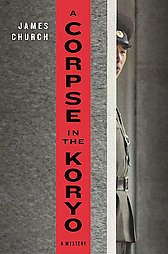
Storytelling (and novel-writing) isn't really about revealing "what happened," it's really much more about delaying the telling. What keeps the reader turning pages is the pursuit of the plot, not the revelation of it. James Church, in his new noir crime novel of North Korea, A Corpse in the Koryo, knows that truth all too well. The book reads less like a crime novel than a spy novel, with the concealments, double-crossing, internal disputes among agencies, and final twists. The blurbs compare the novel with Philip Kerr's Berlin Trilogy (now a tetrology, actually) and the like (novels that use the police procedural to open up a closed society to the reader), but "Corpse" is more like Le Carre in many ways. Yes, it does open up a closed North Korea, validated by the pseudonymous author's professional experience there. But it's less about daily life in that country than about inter-agency strife. The protagonist, Inspector O, has plenty of noir attitude, but he's pulled this way and that by seemingly unrelated (even irrelevant) incidents and stories all the way through--like Marlowe, perhaps, is often pulled away from the main track, but in a way there is no main track visible in "Corpse," until close to the end. As I said above, Church has delayed that revelation of what's happening--not a problem, but more a spy maze than a noir one. And O is curiously open in his disdain for the power structure--though the portrait we occasionally glimpse of that country seems to be one that wouldn't tolerate that in a policeman--but that is explained in the story , in O's "protectors" within the system). And the citizens that populate the novel seem less desperately deprived than we are led by the news to believe about the citizens of that country (a member of that select group, the "axis of evil")--but again, the citizens frequently turn out to be hardly "simple citizens," again a factor making the book seem more like a spy novel. I guess it's not hard to tell that this is a book I admired more than enjoyed. I don't want to put other readers off--it's a fine story, and I'd read a sequel--but I hoped for something different, a book that Church evidently did not set out to write, rather than the one he did. A word about cover art--I've seen a number of books lately that don't utilize that aspect of a book terribly well (as evidenced by some of the ones I've reproduced here)--but A Corpse in the Koryo has a particularly good cover, for which the publishers should be commended. It has a great graphic quality and at the same time expresses a lot about the country it depicts.

No comments:
Post a Comment